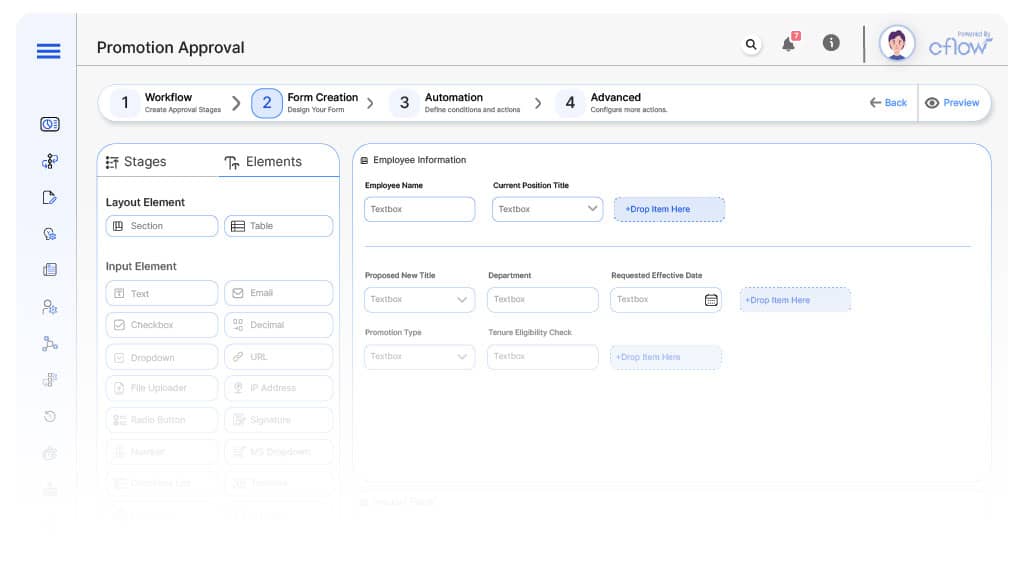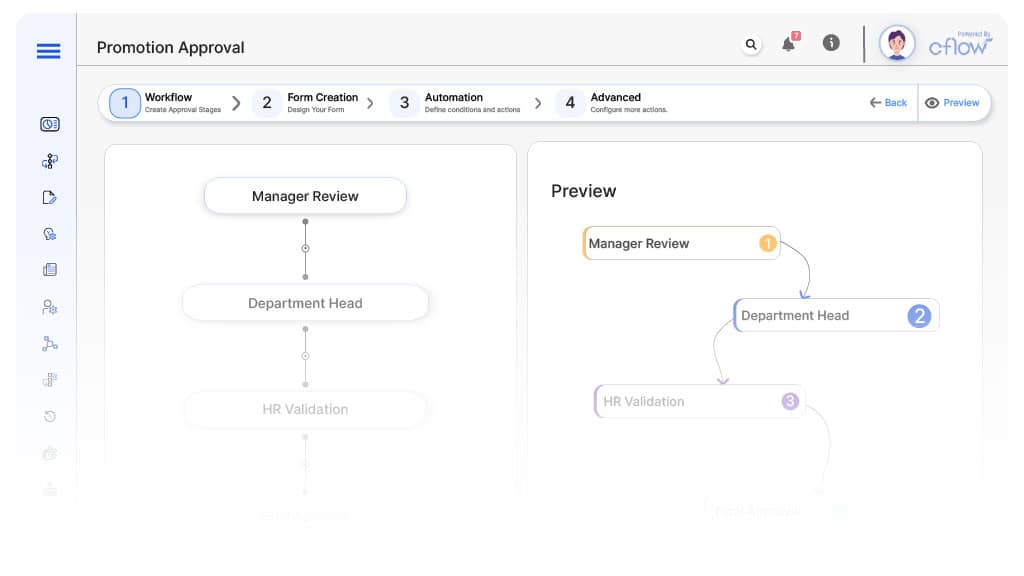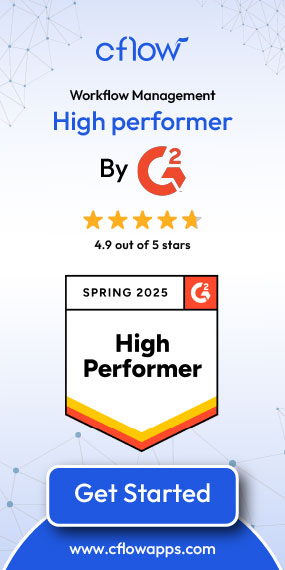- Cflow
- Promotion Approval Automation
Promotion Approval Automation

Clow Team

Promotion approvals are one of the most sensitive HR processes, directly impacting employee satisfaction, compensation budgets, and organizational structure. When handled manually, promotions often get delayed, lack transparency, or fail to follow consistent evaluation criteria, leading to employee disengagement and potential compliance issues.
Recent industry research shows that 42% of employees feel promotions at their company are not handled fairly due to lack of structured workflows.
Promotions often depend on structured evaluations, much like Performance Management Process Automation ensures consistency in tracking performance outcomes.
Without automation, HR teams struggle to coordinate multi-level approvals, validate eligibility, ensure budget alignment, and document decisions for future reference. This guide walks you through exactly how Cflow automates Promotion Approval Process, from form design to final decision.
Table of Contents
What Is Promotion Approval Process?
The Promotion Approval Process is a structured workflow that ensures every promotion request passes through predefined approval layers, eligibility checks, policy validations, and budget controls before finalization. It helps organizations manage promotions consistently while maintaining full documentation for HR audits, compensation planning, and leadership reviews.
Think of promotion approvals like financial transactions, every decision requires careful validation, multiple authorizations, and full traceability. Without structure, promotions risk inconsistency, favoritism, and downstream conflicts.
Every promotion approval is supported by formal reviews, similar to how Performance Review Sign-Off Process Automation captures manager and HR validations.
Recent industry research shows that organizations using automated promotion workflows report 35% higher employee satisfaction with career growth transparency.
Why Promotion Approval Process Is Important for HR Teams
Fairness & Transparency
Budget Compliance
Audit & Legal Readiness
Leadership Alignment
Keeps management fully informed of promotion decisions across departments, supporting strategic workforce planning and fostering organizational cohesion.
Key Benefits of Automating Promotion Approval Process with Cflow
- Centralized Promotion Requests: Cflow consolidates all promotion requests into a single dashboard where HR, managers, department heads, and executives can review status, pending actions, and historical records. HR no longer needs to follow up via emails or spreadsheets, and every request is fully traceable from submission to approval.
- Eligibility Validation Rules: Cflow applies automated rules to check promotion eligibility, such as tenure, performance ratings, required training completion, or budget limits, before the request even enters the approval queue. Ineligible requests are automatically flagged or blocked, saving time for all approvers.
- Multi-Level Sequential Approvals: Cflow routes promotion requests through multiple levels of approval, manager, department head, HR, finance, and executive leadership, ensuring that every stakeholder reviews and approves before final sign-off. Approvals can include conditional branches based on grade level or compensation change thresholds. Internal promotions frequently create vacancies that are backfilled using Job Requisition Approval Automation.
- Real-Time Notifications & Escalations: Automated email and SMS alerts notify approvers of pending tasks. Escalation rules trigger additional notifications if any stage stalls beyond its time limit. HR maintains full visibility into bottlenecks and can intervene when needed.
- Policy & Budget Compliance: Cflow enforces corporate policies related to salary bands, budget allocations, tenure requirements, and eligibility criteria. Requests violating policies are either blocked or require justification and special approvals, ensuring that HR maintains control without delaying compliant requests.
- Audit Trail & Documentation: Every action, from submission to final approval, is time-stamped and logged. HR can retrieve complete promotion records for compliance audits, leadership reporting, or dispute resolution, ensuring full legal defensibility.
- Mobile Accessibility: Managers and executives can review and approve promotion requests from any device. Cflow’s mobile-ready interface ensures that even traveling leaders stay connected to the approval process, preventing unnecessary delays and keeping promotion cycles on track.
Get the best value for money with Cflow
User Roles & Permissions
Employee (Initiator)
- Responsibilities: Submit promotion request (self or manager initiated), complete required justification fields.
- Cflow Permission Level: Submit Form.
- Mapping: “Employees” group.
Manager
- Responsibilities: Review promotion request, add performance justification, approve or reject.
- Cflow Permission Level: Approve/Reject.
- Mapping: “Managers” group.
Department Head
- Responsibilities: Validate department fit, approve budget alignment.
- Cflow Permission Level: Approve/Reject.
- Mapping: “Department Heads” group.
HR Officer
- Responsibilities: Monitor sign-off completion, trigger escalations, finalize cycle closure.
- Cflow Permission Level: Admin.
- Mapping: “HR Team” group.
Finance Approver
- Responsibilities: Verify compensation impact against salary budgets.
- Cflow Permission Level: Approve/Reject.
- Mapping: “Finance Team” group.
Executive Leadership
- Responsibilities: Final sign-off for senior-level promotions.
- Cflow Permission Level: Approve/Reject.
- Mapping: “Executive Team” group.
Compliance Auditor
- Responsibilities: Audit promotion approval trails.
- Cflow Permission Level: View Only.
- Mapping: “Compliance” group.
Discover why teams choose Cflow
Form Design & Field Definitions

Field Label: Promotion Request ID
- Type: Autonumber
- Auto-Populate: Generated on submission.
Field Label: Employee Name
- Type: Text (Read-only)
- Auto-Populate: Pulled from profile.
Field Label: Current Position Title
- Type: Text (Read-only)
- Auto-Populate: From HRIS.
Field Label: Proposed New Title
- Type: Dropdown
- Logic/Rules: Restricted to eligible roles.
Field Label: Department
- Type: Dropdown
- Auto-Populate: From profile.
Field Label: Requested Effective Date
- Type: Date Picker
- Logic/Rules: Must be future date.
Field Label: Promotion Type
- Type: Dropdown (Regular, Fast-Track, Exceptional)
- Logic/Rules: Drives conditional approvals.
Field Label: Tenure Eligibility Check
- Type: Calculated Field
- Logic/Rules: Auto-validates tenure.
Field Label: Performance Score (Last Cycle)
- Type: Text (Read-only)
- Auto-Populate: From Performance Review.
Field Label: Compensation Change (%)
- Type: Numeric Field
- Logic/Rules: Drives Finance approval condition.
Field Label: Manager Justification
- Type: Text Area
- Logic/Rules: Mandatory.
Field Label: HR Policy Validation Notes
- Type: Text Area
- Logic/Rules: Mandatory for HR.
Field Label: Finance Budget Validation
- Type: Text Area
- Logic/Rules: Required for finance sign-off.
Field Label: Executive Comments
- Type: Text Area
- Logic/Rules: Visible for high-grade promotions.
Transform your Workflow with AI fusion
Approval Flow & Routing Logic

Submission → Manager Review
- Status Name: Pending Manager Review
- Notification Template: “Hi {Manager}, promotion request submitted for {Employee}. Please review and approve.”
- On Approve: Moves to Department Head.
- On Reject: Returns to Employee.
- Escalation: Reminder after 3 days; escalate to HR after 5 days.
Manager → Department Head
- Status Name: Pending Department Review
- Notification Template: “Hi {Department Head}, promotion request for {Employee} needs your department-level review.”
- On Approve: Moves to HR Validation.
- On Reject: Returns to Manager.
- Escalation: Reminder after 3 days; escalate to HR.
Department Head → HR Validation
- Status Name: Pending HR Validation
- Notification Template: “Hi HR, promotion request approved by department head. Please validate policy compliance.”
- On Approve: Moves to Finance (if compensation increase above threshold).
- On Reject: Returns to Department Head.
- Escalation: Reminder after 2 days; escalate to HR Director.
HR → Finance Review (if applicable)
- Status Name: Pending Finance Approval
- Notification Template: “Hi Finance, promotion request for {Employee} requires budget approval.”
- On Approve: Moves to Executive Review (if high-grade).
- On Reject: Returns to HR.
- Escalation: Reminder after 2 days; escalate to Finance Controller.
Finance → Executive Leadership (conditional)
- Status Name: Pending Executive Approval
- Notification Template: “Hi Executive, promotion request for {Employee} needs final leadership approval.”
- On Approve: Moves to Promotion Finalized.
- On Reject: Returns to HR.
- Escalation: Reminder after 2 days.
Final → Promotion Finalized
- Status Name: Promotion Completed
- Notification Template: “Promotion for {Employee} fully approved and finalized.”
Transform your AI-powered approvals
Implementation Steps in Cflow
Create a new workflow
Go to Cflow → Workflows → New → Name “Promotion Approval Automation.
Design the form
Set up User Roles/Groups
Build the process flow diagram
Configure notifications
Set conditional logic
Save and publish workflow
Activate process.
Test with a sample request
Adjust logic if needed
Go live
Example Journey: Michael’s Promotion Request
FAQ's
Full setup can be completed in 3–5 days depending on policy complexity.
Yes. Cflow supports conditional approval layers based on grade levels and salary changes.
Absolutely. Cflow integrates with HRIS for employee data and payroll for compensation adjustments.
Yes. Every step, comment, and timestamp is archived for legal compliance.
Unleash the full potential of your AI-powered Workflow

